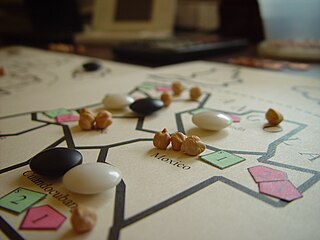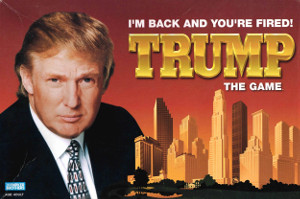Related Research Articles

Board games are tabletop games that typically use pieces moved or placed on a pre-marked board and often include elements of table, card, role-playing, and miniatures games as well.

Monopoly is a multi-player economics-themed board game. In the game, players roll two dice to move around the game board, buying and trading properties, and developing them with houses and hotels. Players collect rent from their opponents, with the goal being to drive them into bankruptcy. Money can also be gained or lost through Chance and Community Chest cards, and tax squares. Players receive a stipend every time they pass "Go", and can end up in jail, from which they cannot move until they have met one of three conditions. The game has numerous house rules, and hundreds of different editions exist, as well as many spin-offs and related media. Monopoly has become a part of international popular culture, having been licensed locally in more than 103 countries and printed in more than 37 languages.

Sorry! is a board game that is based on the ancient Indian cross and circle game Pachisi. Players move their three or four pieces around the board, attempting to get all of their pieces "home" before any other player. Originally manufactured by W.H. Storey & Co in England and now by Hasbro, Sorry! is marketed for two to four players, ages 6 and up. The game title comes from the many ways in which a player can negate the progress of another, while issuing an apologetic "Sorry!"

Charles Brace Darrow was an American inventor who modified the design of Lizzie Magie's original invention The Landlord's Game. He became the first millionaire game designer in history, and although Magie patented her invention she received only $500. Parker Brothers falsely credited Darrow as the original inventor.
In tabletop games and video games, game mechanics are the rules that govern and guide the player's actions, as well as the game's response to them. A game's mechanics thus effectively specifies how the game will work for the people who play it.

SolarQuest is a space-age real estate trading board game published in 1985 and developed by Valen Brost, who conceived the idea in 1976. The game is patterned after Monopoly, but it replaces pewter tokens with rocket ships and hotels with metallic fuel stations. Players travel around the sun acquiring monopolies of planets, moons, and man-made space structures. They seek to knock their opponents out of the game through bankruptcy, as well as optional laser blasts and dwindling fuel supplies.
Monopoly Junior is a simplified version of the board game Monopoly, designed for young children, which was originally released in 1990. It has a rectangular board that is smaller than the standard game and rather than using street names it is based on a city's amusements to make the game more child-friendly. There are many different models of the game.
Free Parking is a Parker Brothers card game inspired by the "Free Parking" space of the Monopoly board game.
Don't Go to Jail is a 1991 Parker Brothers dice game for two or more players inspired by Monopoly. The game is played by rolling ten dice and attempting to roll matches to score points.

Wily & Right no RockBoard: That's Paradise is a spin-off video game title in the original Mega Man series from Capcom. It is a business simulation game that is similar to the board game Monopoly, in which players and the computer AI take turns going around a set of connected circles, buying up property, and charging other participants rent when they land on those spaces.

The board game Monopoly has its origin in the early 20th century. The earliest known version of Monopoly, known as The Landlord's Game, was designed by an American, Elizabeth Magie, and first patented in 1904 but existed as early as 1902. Magie, a follower of Henry George, originally intended The Landlord's Game to illustrate the economic consequences of Ricardo's Law of Economic rent and the Georgist concepts of economic privilege and land value taxation. A series of board games was developed from 1906 through the 1930s that involved the buying and selling of land and the development of that land. By 1933, a board game had been created much like the modern version of Monopoly sold by Parker Brothers and its related companies through the rest of the 20th century, and into the 21st. Several people, mostly in the midwestern United States and near the East Coast of the United States, contributed to the game's design and evolution.

A Get Out of Jail Free card is an element of the board game Monopoly which has become a popular metaphor for something that will get one out of an undesired situation.
Easy Money was a board game introduced by Milton Bradley Company in 1935. Like Monopoly, the game is based on The Landlord's Game in the movement of pieces around the board, the use of cards, properties that can be purchased, and houses that can be established on them.
The Mad Magazine Game, later reissued as Mad Magazine: The "What-Me Worry?" game, is a board game produced by Parker Brothers in 1979. Gameplay is similar, but the goals and directions often opposite, to that of Monopoly; the object is for players to lose all of their money. Play proceeds to the first player's right and the first player is determined by a left-handed roll for the lowest number. The game includes cards, money, dice, and tokens, and the game board features Alfred E. Neuman and illustrations from Mad magazine. By design, no conclusive strategy exists for the game, since even if a player is winning, several spaces and cards direct players to exchange money or chairs with others, causing advantages to be lost instantly.

Monopoly: The Mega Edition is a special variant of the popular board game Monopoly. The game was first published in 2006 by Winning Moves Games USA in the USA. A UK version was adapted in 2007.

Monopoly money is a type of play money used in the board game Monopoly. It is different from most currencies, including the American currency or British currency upon which it is based, in that it is smaller, one-sided, and does not have different imagery for each denomination. It is not legal tender and has no monetary value in any jurisdictions.
Family Game Night was an American television game show based on Hasbro's family of board games and EA's video game franchise of the same name. The show was hosted by Todd Newton. Burton Richardson announced for the first two seasons, until he was replaced by Stacey J. Aswad for the third season, and then Andrew Kishino beginning in the fourth season. The 60-minute program debuted on October 10, 2010, on The Hub, formerly Discovery Kids. The network would become Discovery Family on October 13, 2014; it was previewed on October 9, 2010, on its sister channel, TLC. Seasons 1 and 2 each contained 26(1) and 30(2) episodes. Seasons 3, 4 and 5 each contained 15 episodes. Season two premiered on Friday, September 2, 2011, and additional games were added. The games added to the second season included Cranium Brain Breaks, Green Scream, Ratuki Go-Round, Simon Flash, Operation Sam Dunk, Trouble Pop Quiz, and Spelling Bee. However, games from the previous season were still kept.

Game design is the art of applying design and aesthetics to create a game for entertainment or for educational, exercise, or experimental purposes. Increasingly, elements and principles of game design are also applied to other interactions, in the form of gamification. Game designer and developer Robert Zubek defines game design by breaking it down into its elements, which he says are the following:
Monopoly Millionaires' Club is an American game show that debuted in syndication on March 28, 2015. Hosted by stand-up comedian/actor Billy Gardell, best known for his role as Chicago police officer Mike Biggs on the sitcom Mike & Molly, it was initially based on an unsuccessful drawing game of the same name that was coordinated by the Multi-State Lottery Association (MUSL), using the Monopoly board game brand under license from Hasbro. The lottery game returned, in scratch-off form, in the spring of 2015.

Trump: The Game is a board game named after American businessman Donald Trump. Milton Bradley Company initially released the game in 1989, but it sold poorly, with only 800,000 copies sold out of an expected two million. Parker Brothers re-released Trump: The Game in 2004 following the success of Trump's reality television series, The Apprentice, from earlier that year. Trump: The Game received mixed reviews from critics and the public audience.
References
- 1 2 "Express Monopoly" (PDF). hasbro.com. 1993.
{{cite web}}: CS1 maint: url-status (link)